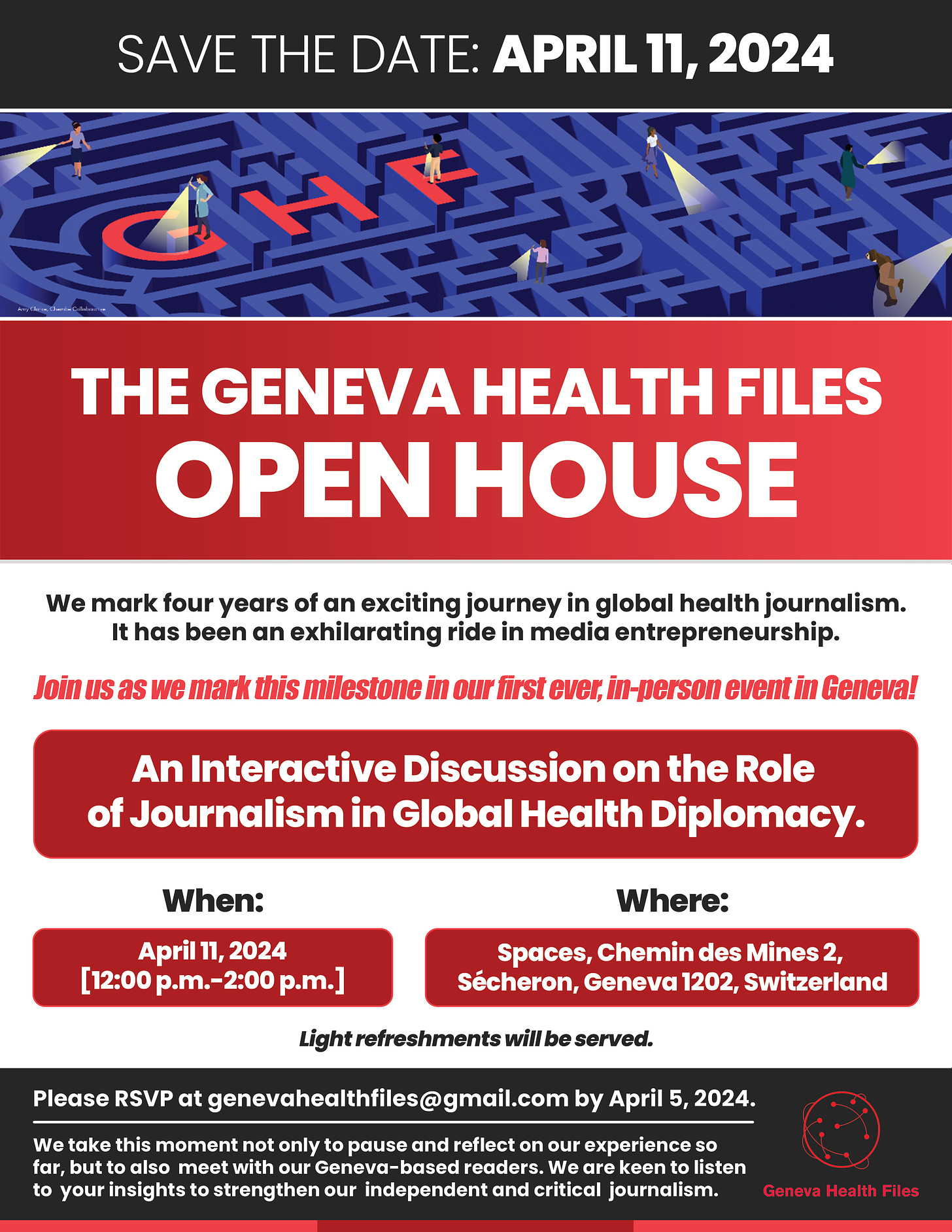Geneva Health Files is Four; Jan-April 2024 [GHF WRAP]
The Q1 2024 Roundup from Geneva Health Files
Dear Readers,
I am delighted to celebrate a key milestone with you.
This month Geneva Health Files completes four years in operation! During this period we have built a proof of concept in media entrepreneurship, consolidated our operations and have broken new ground with our signature analyses and reporting. Our community has expanded, with global health and media experts who have helped me in this mission in contributing towards greater accountability in global health policy-making by rigorous and critical journalism. (Watch a video on our story here.)
We are keen on hearing from our readers. We are having two events this month. An online event on April 4, 2024, for which you can register here.
Our Geneva-based readers are welcome to join us for our first-ever Open House on April 11, 2024. Please drop us a line at genevahealthfiles@gmail.com by April 5. (See details on both events in our announcements below.)
Nurturing this unique journalistic initiative has been an intense and difficult effort, yet immensely rewarding. Thank you for your engagement. We need more readers to support us to ensure this kind of journalism thrives.
Support public interest global health journalism, become a paying subscriber. Tracking global health policy-making in Geneva is tough and expensive. Help us raise important questions, and in keeping an ear to the ground. Readers paying for our work makes this possible.
Our gratitude to our subscribers who help us stay in the game!
In this edition, we also share a wrap over 25 stories from the first quarter of 2024.
More soon!
Best,
Priti
Feel free to write to us: patnaik.reporting@gmail.com or Follow us on Twitter: @filesgeneva
Highlights: Jan-April 2024
Compiled by Sana Ali
Treaty Talks
[March 29] The Fate of the Pandemic Agreement Hangs in Balance, Will be Determined by “Process”. Hinges on a Deal on Access & Benefits-Sharing Mechanism
Heading into the penultimate weeks of negotiations towards a concluding a new Pandemic Agreement, the outlook has seldom looked so grim in the circuitous and difficult discussions of the last two years. Yet, many countries continue to be determined and committed to preserving the original stated goal of these negotiations - namely to make efforts to address the existing paradigms that have affected how the world fares during health emergencies particularly pandemics, in order to prevent the inequities witnessed during COVID-19.
[March 25] Pressure To Conclude Pandemic Agreement Mounts, But Countries Hold Onto Positions
As the unforgiving clock ticks away, WHO member states are under increasing pressure to conclude negotiations towards a new Pandemic Agreement, and yet many countries seem determined to hold on to their positions. This shows the high stakes and the now-never game that these discussions have come to represent.
[March 21]Shift in Position: Pharma Industry is Warming Up to "Pathogen Access & Benefits Sharing", But Wants Unconditional Access Sans Obligations on Sharing Benefits
Industry interest could help reach consensus on new mechanism for accessing pathogens and sharing benefits in a Pandemic Agreement, if countries agree on matters of data, contributions and binding contracts.
[March 19] Negotiating Text for Pandemic Agreement Gets Panned by Developed Countries, Stage Set For Tough Fight
The opening of the meeting that was webcast, was emblematic of the inherent tensions that have underpinned this two-year old process, now coming to a head with just days remaining to conclude the negotiations.
[March 18]Pandemic Agreement Negotiations: Countries Rearing To Go, But Concerns on Process Continue
In a restricted briefing organized by the INB Bureau recently, for member states and for non-state actors, countries reaffirmed their commitment to the fast-approaching deadline of May 2024 to conclude the negotiations, even as major developed countries highlighted concerns on process, sources familiar with the discussions said.
[March 12] New Negotiating Text of the Pandemic Agreement: Watered Down Language, But Ticks Boxes on Key Provisions
The Bureau of the Intergovernmental Negotiating Body released the latest version (unedited) of a negotiating text spanning 30 pages with 37 articles. The expectation is that this version will be taken up for text-based negotiations at the ninth meeting of the INB starting next week in Geneva between March 18th-March 28th.
[March 11]"Equity" in the International Health Regulations, Makes it to the Negotiating Table
Countries find themselves again at the cusp of reframing and making these rules fit for purpose, albeit in a world with fractured priorities, continuously being shaped by commercial and political compulsions.
[March 4]Mild Optimism? Countries Keen on Reaching May 2024 Finish Line for WHO’s New Pandemic Instrument, Within A Handful of Negotiating Days
Despite continuing divergences on key issues from technology transfer, financing, to access and benefit sharing, some countries are beginning to see a small possibility of concluding negotiations for a new Pandemic Instrument.
[Feb 29] The Challenges in Aligning Two Track Negotiations in Global Health: Equity, Financing, Governance & Monitoring as Sticking Points
In a joint session that brought together the ongoing two track negotiations to reform the international health emergency regime, WHO member states had difficulty rationalising and aligning common areas on equity, financing, governance and monitoring issues at a meeting last week in Geneva. The session was part of the ongoing eighth meeting of the Intergovernmental Negotiating Body set up to pull together a new Pandemic instrument.
[Feb 24] Pandemic Regulations or Pandemic Agreement? Growing Affinity for Article 21 Over Article 19 of WHO Constitution, as Some “Treaty” Proponents Rethink Underlying Legal Provisions of New Rules
For global health legal geeks following the tortuous discussions on the reforms to the governance of health emergencies, it is a big deal. For the others, you may wonder why two different numbers can matter so much. Read on, to know more!
[Feb 20] Developing Countries Mean Business on Equity Provisions in Pandemic Agreement. Will it Count?
Scores of developing countries pulled their weight in a bid to push for equity provisions in a new Pandemic Agreement at the opening of the latest meeting of the Intergovernmental Negotiating Body (INB), set up to establish a new Pandemic Agreement.
[Feb 16] Will Countries Begin Text-Based Negotiations for a Pandemic Agreement Next Week: The What, How and Why Not?
As WHO member states begin the final lap of intense negotiations on reforming the governance to health emergencies, the burden of expectations to reach an agreement in less than three months is getting acute.
[Feb 10] Equity Provisions in the IHR: A Race Against Time
During this week’s discussions on amending the International Health Regulations, developing countries tried relentlessly to keep the equity agenda on the table of the working group. They may have succeeded for now. The second part of this sermon: “knock, and it shall be opened unto you: For every one that asketh receiveth; and he that seeketh findeth; and to him that knocketh it shall be opened…” (As an agnostic, I am skeptical about this.)
[Feb 7] Developing Countries Seek to Retain Equity Provisions in the Amendments to the IHR
Expectations are high, and yet tempered, as countries draw closer to finalising amendments to the IHR ahead of the May 2024 deadline. The story to follow here, is whether and to what extent, countries will be able to tie and compliment the IHR process in step with the negotiations towards a pandemic treaty.
The Files In-Depth
[Feb 5] WHO’s Global Health & Peace Initiative: Political or Diplomatic?
The context in which this discussion is unfolding is striking given the simultaneous conflicts in different parts of the world. But laid over the complex dynamics in global health, these conflicts serve to bring into clarity where member states of WHO stand in relation to each other, and in relation to the mandate of the WHO.
[Jan 31] WTO to Pull the Plug on Extension Decision on COVID-19 Tests & Treatments. TRIPS Chair Calls for “Conclusion” as Talks "Exhausted"
Developed countries have managed to push the TRIPS waiver talks over the precipice. After an arduous push uphill since the time developing countries led by South Africa and India, first brought the proposal to the WTO in October 2020, the “waiver” talks will soon be concluded, failing to reach consensus among members. (The original proposal had sought a time-bound temporary waiver of certain IP rules boost production of COVID-19 medical products.)
[Jan 27] Regressive Politics on Climate & Gender, Crash Against WHO’s Gates, Impinging on Global Health Policy Space
From walking away on agreed negotiated language around climate change, to raising fundamental questions on women’s sexual and reproductive rights, WHO member states are regressing from hard won battles. These unfortunate efforts to globalize insecurities, harms women and girls everywhere, and hurts multilateralism in global health. That in 2024, some WHO member states are negotiating whether women have rights to their bodies is telling.
[Jan 25] Green Light for WHO to Raise Resources to Beef Up Finances; Countries Set Tighter Processes To Streamline WHO Spending
In a significant decision this week, the WHO Executive Board has set in motion the process to help WHO raise resources through an “Investment Round” later in 2024. This is even as other detailed measures are being put in place for greater transparency and accountability to not only ensure how WHO manages and spends its money, but also how it uses its resources to set priorities.
[Jan 23] Headwinds from Climate Politics at WHO Executive Board Meeting
Headwinds from the climate politics blew into the WHO Executive Board meeting that began in Geneva this week. Even as there is recognition that our planet is inflamed by the climate crisis with existential implications on human health, among other far-reaching consequences, some countries including Russia, North Korea, this week, objected to WHO’s additional efforts to address these challenges at this crucial intersection.
[Jan 17] Proposal For New Technical Committee to Streamline Functioning of WHO Governing Bodies
WHO punches above its weight. Though hamstrung by a relatively small budget compared to its mandate, the UN’s only technical agency works across multiple normative and operational areas simultaneously. Member states of WHO want to make this organization nimbler, notwithstanding the large UN bureaucracy that it really is.
[Jan 10] WHO Seeks to Raise US$7 Billion in First Ever Investment Round in 2024, Executive Board to Consider Proposal This Month
The year 2024 could prove to be significant for the chronically under-funded World Health Organization, as it seeks to raise US$7.1 billion on a “voluntary” basis for technical programmes from a range of donors.
Guest Essays
[March 8]Reforms to the International Health Regulations must advance human rights By Lisa Forman*, Judith Bueno de Mesquita, Luciano Bottini Filho, Matiangai Sirleaf, and Benjamin Mason Meier
This overlap with human rights is recognized in IHR article 3 which requires its implementation to be with “full respect for the dignity, human rights and fundamental freedoms of persons.” Yet state responses to COVID-19 underscored profound gaps and weaknesses in the IHR’s ability to effectively govern a public health response to the international spread of disease while protecting and promoting human rights.
[Feb 27]On the Brink of Legitimizing Inequity: Negotiations at WHO for a Pandemic Instrument & Amending the IHR by K.M Gopakumar
The promise of equity in Pandemic Preparedness and Response was the gauntlet thrown in to draw countries into long drawn negotiations. And yet, as these ongoing negotiations come to a head, countries and their institutions have, so far, faltered in coming to a consensus on carving out binding obligations to prevent inequities in the future.
[Jan 12] Examining Management Consultants in Global Health By Tine Hanrieder and Julian Eckl
Consultants have been described as wizards – superior analytical minds who can turn around businesses – but also as pretenders who sell management fads and quasi-academic insights to businesses and governments. In our recent research on the World Health Organization (WHO), one of our interviewees also described them as ‘priests’ – companies that are hired to transform the organization on the basis of the ‘bible’ (organizational strategy). Yet, this neutral, detached image as a technical servant to a public organization, is misleading.
The Files Brief
[Feb 15] WTO Members Agree to Disagree on TRIPS Extension Decision; Misfired: When the WTO Got Lovesick
WTO members continued to disagree on whether the TRIPS Decision needed to be extended to include COVID-19 diagnostics and therapeutics. This was reflected in a report discussed at a formal meeting of the TRIPS council this week. The report was subsequently shared at the General Council meeting this week.
I. ONLINE EVENT: APRIL 4, 2024
Register here: https://www.eventbrite.com/e/geneva-health-files-behind-the-scenes-tickets-864414827017?aff=oddtdtcreator
II. EVENT IN GENEVA: APRIL 11, 2024
RSVP by April 5, 2024 to genevahealthfiles@gmail.com
Global health is everybody’s business. Help us probe the dynamics where science and politics interface with interests. Support investigative global health journalism.






